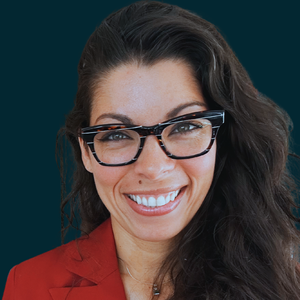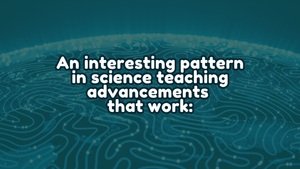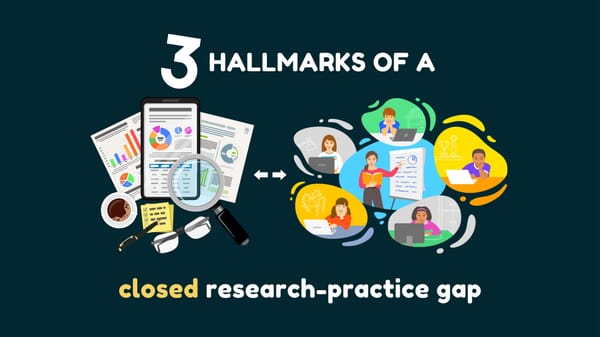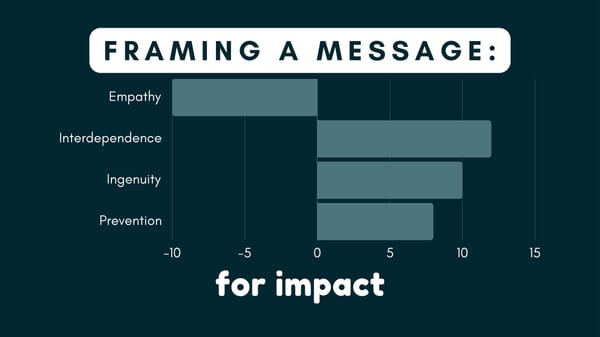One of my proudest achievements as an early-career scholar was landing a Research Experiences for Undergraduates (REU) at Moffitt Cancer Center in the Stabile Research Building.

I had just completed an internship at a hospital, and what I witnessed crushed my interest in pursuing an M.D. and treating patients. As a first-generation American, I felt aghast at not being exceptional and demonstrating my family’s belonging in the U.S. by becoming a doctor. So, I confided in a friend who informed me that other types of doctors (Ph.D.) sought to advance the boundaries of knowledge.
Intrigued, I searched and encountered research papers for the first time.
Later that week, as I passed the Stabile Research Building on my usual walk to class, I wondered about the research conducted in those halls and if I could participate.

I entered the building to ask the person at the information counter if they had an internship program. They politely informed me that, while there are no internships, I could join the Research Experiences for Undergraduates program (an internship 😅) next year (as I’d missed this year’s deadline).
Audacious even then, I identified research papers of the scholars at Stabile, read the ones I found most interesting (and could decipher), and emailed the authoring research faculty. I praised their work and asked them to volunteer in their labs as an REU. Drs. Robert Gillies and Gatenby replied to these emails, allowed me to work with their team of scientists, and changed the course of my career (thank you!).
I cried the first time I entered the building. It’s a gorgeous facility, and I felt I had made it simply by being permitted to enter this space. I used my key card to access the upper levels.
I spent my time culturing ductal carcinoma in situ (breast cancer cells) and treating them to rounds of hypoxia (low to no oxygen) to observe the Warburg effect (the observed malignancy in cancer associated with aerobic glycolysis).
I followed protocols written on papers secured in page protectors and did my best to maintain the data collection process for my mentors.
While who I was mattered greatly to me, I thought it was of little consequence to how data were interpreted. I observed how the scientists strove to remain logical, objective, and precise with their language, writing, and constitution.
This was before I studied socially constructed human systems (like education). This was before I realized how I, as a scientist, impact research, whether molecules or students.
This was before I learned to ask a Critical question:
Who (or what) does my upholding this status quo benefit?
What is Positionality?
Where positivism deals with the whats and hows, my experiences have led me to consider whys and what ifs.Positivism captures traditions of Western science seeking objectivity; it is a philosophy that assumes we can set aside our humanity in favor of the “scientific method.”
Groomed as positivists, it can be challenging for us to understand why who we are is of any consequence to what we observe, but this, in its essence, is called positionality.
The conversations, education, and perspectives I learned influenced the research I do and did. It was not inconsequential to the study that, up until a few months prior, I was an outsider to the norms of conducting academic research. What I knew of research existed within the walls of the Stabile Research Building and the knowledge my mentors conveyed to me.
Similarly, my mentors’ research knowledge (while more advanced) was still limited to their experiences, readings, and the mentorship they received. Our collective understanding of culturing breast cancer cells, the influence of hypoxia, and the Warburg effect were all grounded in who we were and what we learned from our varying degrees of access to science and academic research.
Positionality is acknowledging the limits of the information we’ve accessed while striving to understand what we observe.
A positionality statement is a disclaimer wherein researchers acknowledge how their experiences, readings, and mentorship shaped their interpretation of the observed data.
These statements usually include:
- How the researcher has interacted with the constructs, subjects, or roles under investigation,
- Aspects of the researcher’s identity (like race, nationality, ethnicity, gender, sexuality, disability status, etc.) that impact their worldview, reception, or access to information,
- Any readings, mentorship, personal experiences, or biases related to the research topic and
- An accounting of ways the researcher's positionality may impact the study.
While a researcher’s positionality is often implicitly communicated through their writing, positionality statements provide explicit transparency. This allows readers to understand potential biases and read the work more critically, with fewer assumptions. For researchers, this reflexive exercise can promote self-awareness and illuminate theoretical and methodological limitations to their work.
The Positionality Controversy
Before we dive into this controversy, I feel I owe you my positionality so you can better understand where my voice fits in this discussion:
As an early-career, autistic, cis-gendered first-generation American Latina researcher of the physical and social sciences, I recognize my combination of insider/outsider statuses and inherent biases in this discussion. While positionality statements introduce personal details into formal academic writing, acknowledging our inherent subjectivity allows us to consider how we shape our collective reality. No researcher can be entirely objective or remove all biases. However, transparency through positionality statements can enable researchers and readers to assess potential influences on the research process critically. Denying our bias or subjectivity upholds notions of impersonal objectivity that diminish unique and marginalized voices in academia. Positionality statements are vital in ethical, rigorous research across disciplines. Particularly in STEM, we seek to remove our humanity in favor of perceived objectivity, even when studying socially constructed systems. I also leave space for my ideas to evolve as my thinking shifts throughout my research career.
The controversy surrounding positionality statements encompasses several vital points.
First, there is debate about whether positionality statements should be included in academic writing. Some argue that these statements introduce bias into research, while others contend that all research inherently carries some form of bias.
The debate extends to whether positionality has a place in "hard" sciences such as physics and chemistry, as opposed to being primarily relevant to the social sciences. Critics worry that this focus on identity may overshadow the objective analysis of research findings.

The appropriateness and applicability of positionality statements across different fields of study remain topics of discussion.
For example, here's some (paraphrased) feedback I received on a review of a publication in chemistry education research:
Embedding a positionality statement in chemistry education research is a staple of graduate theses. At some point long ago, at least two or three editors of the journal researchers tried to get these statements into published papers. Simply put, the authors edited them out upon review by the editors. The field learned not to include them in papers, so you're asking to turn back the clock in some respects and have more qualitative traditions emerge.
Another (paraphrased) review received by a colleague in my field:
Is this entire paragraph necessary at all or essential here? I recommend relocating this paragraph to the limitation section, but first, I have some concerns about the paragraph's content. As a chemistry education research community, have we stopped accepting that we are aware of our potential for bias and have made conscious efforts to mitigate such bias from our research? Furthermore, I'm apprehensive about declaring that the authors are cis-gendered white women offering limited and privileged perspectives. Does this mean that all cis-gendered white women are confidential and therefore biased, and we should doubt their data interpretation? Including this statement would set a consequential precedent and even be offensive to some readers.
Overall, these concerns raise questions about the influence of positionality on the researcher's perceived ability to maintain impartiality and explore alternative interpretations. Fears exist that positionality statements may be misused to criticize or dismiss research unfairly by attacking the researcher's identity. There are also concerns that positionality statements can encourage self-censorship or pressure researchers to share identities beyond their comfort level.
In conclusion, the controversy surrounding positionality statements stems from diverging views on objectivity in research, “established” academic writing conventions, and the role of researcher identity in interpreting and presenting data. These ongoing debates reflect the complex and evolving nature of academic discourse.
To explore differing perspectives on the controversy around positionality statements, click here.
Why Researchers Should Be Reflexive
Remember this question?
Who (or what) does my upholding this status quo benefit?
Denying positionality benefits dominant scientific groups.
It allows science to remain exclusionary, denying that we might all have differing access as insiders/outsiders in our disciplines and broader society. Further, positionality challenges notions of “pure objectivity” that are useful for discrediting scientific findings that threaten societal norms. Finally, acknowledging positionality introduces ethical and social responsibilities that some wish to avoid.
Embracing our inherent subjectivity through reflexive exercises brings several benefits:
- Transparency and Critical Reading: Positionality statements allow readers to understand the researcher's perspective and potential biases, enabling them to engage with the work more critically.
- Reflexivity and Self-Awareness: Acknowledging positionality reminds researchers of how their identity shapes their interpretation of data, promoting self-reflection and reflexivity in the research process.
- Amplifying Marginalized Voices: Positionality statements give voice to researchers from marginalized groups, allowing them to acknowledge how their experiences inform their work and challenge exclusionary practices in science.
- Ethical Considerations: Positionality statements uphold ethical practices by acknowledging power dynamics, insider/outsider status, and privilege when studying marginalized groups.
- Contextual Evaluation: Positionality statements provide essential context for readers to evaluate research findings, encouraging a nuanced understanding beyond surface-level interpretations.
- Methodological Rigor: Addressing positionality prompts researchers to counteract potential biases and enhances methodological rigor, strengthening the credibility and validity of findings resulting from qualitative, quantitative, and mixed methods.
By embracing subjectivity and replacing notions of pure objectivity with transparency and reflexivity, researchers contribute to a more equitable and meaningful study of various topics.
Positionality statements serve as a valuable tool in the research process, and (to each researcher’s comfort level) these statements can be a valuable practice for advancing science.
How to Write a Positionality Statement
Researchers, feel free to comment on this newsletter with examples of positionality statements. I would love to create a repository for those seeking support in this valuable reflexive exercise. Thank you!
To promote the practice of writing positionality statements and engaging in reflexivity as researchers, below are ten essential steps supported by insights from esteemed researchers.
- Reflect deeply on your identity, experiences, biases, and values that shape your worldview.
- Identify aspects of your positionality most relevant to your research context, such as race, gender, class, sexuality, or ability.
- To your comfort, be authentic and candid, acknowledging any insider/outsider status and limitations in your perspective.
- Share your narrative as a researcher, highlighting your starting point and the evolution of your thinking.
- Connect your positionality directly to your research questions, methods, analysis, and conclusions.
- Consult with others with different social positions to validate interpretations and address blind spots.
- Avoid vague statements and be specific about your positionality to provide clarity to readers.
- Update your positionality statement as your thinking evolves throughout the research process.
- Strive for concision while maintaining reflexivity, aiming for 1-2 paragraphs highlighting key influences.
- Embrace vulnerability and critical self-examination, modeling these qualities for other researchers.
By following these steps, researchers can pave the way for greater transparency, critical engagement, and ethical practices.
Let's continue the discussion in the comments, and if you found this content helpful, consider subscribing or sharing.
Thank you for supporting efforts to advance science education reform and this community!
Resources & References
- Bourke, B. (2014). Positionality: Reflecting on the Research Process. The Qualitative Report. https://doi.org/10.46743/2160-3715/2014.1026
- Glas, A. (2021). Positionality, Power, and Positions of Power: Reflexivity in Elite Interviewing. PS: Political Science & Politics, 54(3), 438–442. https://doi.org/10.1017/S1049096520002048
- Ovens, A., & Fletcher, T. (2014). Doing Self-Study: The Art of Turning Inquiry on Yourself. In A. Ovens & T. Fletcher (Eds.), Self-Study in Physical Education Teacher Education: Exploring the interplay of practice and scholarship (pp. 3–14). Springer International Publishing. https://doi.org/10.1007/978-3-319-05663-0_1
- Porisky, A., & Glas, A. (2023). Insiders, Outsiders, and Credible Visitors in Research. PS: Political Science & Politics, 56(1), 51–55. https://doi.org/10.1017/S1049096522001172
- Probst, B. (2015). The Eye Regards Itself: Benefits and Challenges of Reflexivity in Qualitative Social Work Research. Social Work Research, 39(1), 37–48. https://doi.org/10.1093/swr/svu028
- Secules, S., McCall, C., Mejia, J. A., Beebe, C., Masters, A. S., L. Sánchez-Peña, M., & Svyantek, M. (2021). Positionality practices and dimensions of impact on equity research: A collaborative inquiry and call to the community. Journal of Engineering Education, 110(1), 19–43. https://doi.org/10.1002/jee.20377
- Simon, G. (2018). Eight criteria for quality in systemic practitioner research. https://doi.org/10.28963/1.2.5
- Soedirgo, J., & Glas, A. (2020). Toward Active Reflexivity: Positionality and Practice in the Production of Knowledge. PS: Political Science & Politics, 53(3), 527–531. https://doi.org/10.1017/S1049096519002233









Member discussion